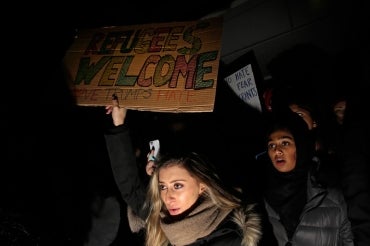Here's what happened when U of T students urged people to open their homes to people affected by Trump travel ban

Published: February 2, 2017
As the U.S. shut its doors to travellers from a number of Muslim-majority countries, four University of Toronto undergraduates encouraged people to open their homes to those affected by the ban.
In the confusion following U.S. President Donald Trump’s executive order, the students made a Facebook group to connect stranded travellers with temporary hosts in Toronto. More than 600 people joined the group after it was created on Saturday.
People reached out from across the GTA and as far as Montreal. Members offered everything from space in a downtown condo to a futon in Cabbagetown. Need a playpen, space for four people, Wi-Fi, a bilingual host? Done. Two spare bedrooms, blow-up mattresses? An entire, furnished basement apartment? Done and done.
Those volunteering to open their homes took the time to include thoughtful details about extras on the premises, like non-allergenic dogs, friendly cats – even 4-year-olds willing to share toys.
But in the end, nobody asked the group for temporary lodging, said Hiatt Differ, one of the administrators and a second-year English major at U of T.
“Thank goodness there was no one actually trapped at the airport,” he said. “The reaction tells me people were looking to be generous at this difficult time.”
Anna Korteweg, chair of the department of sociology at U of T Mississauga, was one of many who joined the group over the weekend.
“My thoughts on people offering up their homes to stranded travellers are that people truly want to provide a counterweight to Mr. Trump’s xenophobia and Islamophobia,” she said.
“My sense is that these offers of sharing our private spaces affirms a shared humanity and speaks to the sense of crisis we feel as the Trump Administration ignores refugee conventions, tramples democratic achievements (however incomplete), and undermines the state of law.”
The students were not alone in their desire to help. In the hours that followed, Canada’s Immigration Minister Ahmed Hussen said the government would find temporary lodging for anyone stranded by the order and Airbnb promised free emergency housing to Muslim travellers.
Differ and the group’s co-founders – Victoria Butler, Elena Senechal-Becker, Līva Zemitis – are now looking for other ways to harness the members’ generosity. In the group’s description, they encourage people to donate to organizations fighting Trump’s travel ban and helping refugees, including the International Rescue Committee, the Council on American-Islamic Relations and the American Civil Liberties Union.
The idea for a group to help travellers stuck in airports came to the students after they discussed a news story about the ban, which one of them posted on Facebook.
“I think all of us felt the same way, which is to say we were shocked and horrified,” said Zemitis. “The idea to ban someone based on where they were born or the religion they practice is not humanitarian. It’s not right.”
After seeing that no group existed to help travellers find a place to stay, they made one themselves. Their initiative was covered by local media.
See the CBC News story
Learn more about the effort at CityNews
For Zemitis, the ban hit close to home since her grandparents came to Canada as refugees from Soviet-occupied Latvia during the Second World War, she said.
“Countries were so ready to help, and that was so wonderful for us,” she said. “The spirit of taking in refugees should be universal.”
For now, the Facebook page bears the following message:
“As the dust settles, the situation is revealed to be exactly what we could have hoped for: no one seems to have been stranded, and we have received no help requests so it seems that this group that came together literally overnight will not be necessary. We have reached out to the government so they know that your offers are available and done what we can to ensure that anyone in need of our help in the future will be able to contact us. Now, please let us emphasize: as we see it, the fact that this group will not be necessary by no means makes your support less impressive. Your humane, generous offers of your own homes and resources are exactly the kind of response that we all dream of in difficult times like these, exactly the response that true democracy demands. Yours is the sort of compassion that moves mountains, and we are enormously grateful. Thank you, every one of you. We wish you all the best, and we will be in touch if your help is ever needed in the future!”



